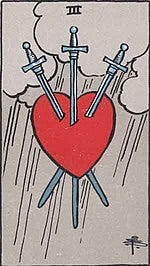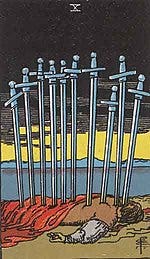The swords of the mind
Why the suit of swords in the tarot is so terrifying and what it teaches us about how our minds work
Hi! This is free post and I’m so glad you’re here. Show your appreciation by clapping really loud and then subscribing if you haven’t or becoming a paid subscriber. You can sign up for a month if a year seems like too much of a commitment (I feel you). Thanks!
If you’ve spent any time looking at a tarot deck, you might have noticed that the suit of swords is, well, brutal. There’s the iconic three of swords, a heart in a stormy sky being pierced by three swords. Then the five and seven, where people appear to be stealing swords. Sure, in the six of swords people look like they’re getting away from something or going on a journey, but their boat is pierced with swords, so that doesn’t look like it’s going to end well. In the eight, someone’s surrounded by swords, tied up and blindfolded. At nine, a woman looks like she’s been woken by a nightmare or that she’s so anguished she couldn’t get to sleep in the first place.
Then the whole suit culminates with the ten of swords—a figure lying on the ground, pierced by ten swords like some sort of human pincushion. It doesn’t get much scarier than that.
Maybe it says something about me that the swords are also my favorite suit of the tarot, even before I found a way of understanding them that makes sense to me The swords are intense, but there’s also a kind of beauty there—something in the imagery that resonates. Who hasn’t felt at some point like they’ve been stabbed in their heart? Who hasn’t looked at the image of a prostrate person punctured by many swords and thought—“Yeah, that’s me.”
The swords are compelling but also scary, until I found a way to understand the swords that makes sense to me. Lindsay Mack has an inclusive, trauma-informed approach to tarot that she calls Tarot for the Wild Soul. From her perspective, there are no good and bad cards in the tarot. Each card offers its own medicine—a message to bring us into the present and help figure out what the hell’s going on with our minds and hearts and spirits.
The swords, specifically, are the suit of the mind or the ego. Some tarot traditions describe the swords as like the mind, a tool that sharply cuts through to the truth. This is consistent with a long tradition in Western thought that sees the mind as the big rational boss in charge of logic, ruling over our more emotional, bestial bodies. The mind is the charioteer or the rider and our emotions are the horse. In this very old dualism, mind is clearly superior to body.
That all sounds nice, but it isn’t how my mind works a lot of the time. My mind tells me some stories that are, well, let’s be honest, just not true. If you shift your understanding of the swords from mind as a honed instrument that trims away everything else until the truth is revealed and instead see the swords as the real pain that our minds can inflict on us, the cards start to make a lot more sense. Or they do to me, at least.
This is more of an Eastern-influenced understanding of mind. My favorite metaphor for understanding mind this way is monkey mind. Our minds are like monkeys, picking up this and that, in constant, frantic motion. More often than we’d like to admit, flinging some poo. Our minds are not rational and logical, but actually animal-like, too.
When you understand mind from this perspective, the suit of swords starts to make more sense. The stories our minds tell us can cause real pain, like a sword to the heart. Sometimes the best way to heal is to gently ask our minds to be quiet so that we can listen to other voices—our hearts or spirits or deep inner knowledge.
The mind isn’t bad. It’s not the enemy. Obviously, we need our mind for all the useful things it helps us do. Write these sentences. Count to ten. Follow a recipe. Read. There are lots of amazing things that wouldn’t be possible without the mind.
But, also, the mind or ego is a bit of a bossy-pants. Give it an inch and your mind will take a mile. And it ALWAYS knows exactly what needs to be done RIGHT NOW. It is very good at constructing narratives, even when those narratives have very little connection to the truth.
Me: Hmm, why hasn’t my friend/partner/family member texted me back?
My mind: Oh, because they’re mad at you. Or maybe they find you annoying and don’t want to talk to you. You should text them less, you know. You’re so needy. Or, ooh, I know! It’s because they hate you. In fact, everyone probably hates you.
That’s a story, for sure, but not a particularly useful one.
The suit of swords is about learning to live with our bossy-pants, story-telling brain. That’s a worthwhile and important journey, but also one that might draw some blood along the way. The narratives our mind makes up for us are sometimes real survival tools. They’re weapons that got us through some bad shit in our lives. Putting them down isn’t easy, even if it might be better in the long run.
Once you see the swords this way, each individual card starts to make a lot more sense, as well as being a lot less scary. The seven of swords becomes a story about never having enough, about the way in which our minds convince us the grass is always greener on the other side. Yes, we’ve already got five swords in our hands, but if we could just get those other two, everything would be better. If we could just lose weight/make more money/have more time/find the perfect someone, then everything would be perfect.
The five of swords is about finding ways to forgive ourselves for the mistakes our mind might lead us into. The eight asks us to think about what narratives of being trapped or stuck our mind might have created for us. And that scary ten card? The human pincushion? That’s a gentle suggestion that maybe there are some thinking patterns it’s time to kill off. We all have some of those.1
The swords aren’t a gentle suit because, sadly for most of us, our minds aren’t always particularly gentle. Our minds can give us a lot of pierced hearts and sleepless nights. But the suit gives us something to aspire to—a kinder, gentler mind—and that seems worthwhile.
All of these card interpretations come from Lindsay Mack—her online classes and podcast and website and you should check them all out, because Lindsay is amazing. Even if you’re not into the tarot, she has lots of good things to say.





